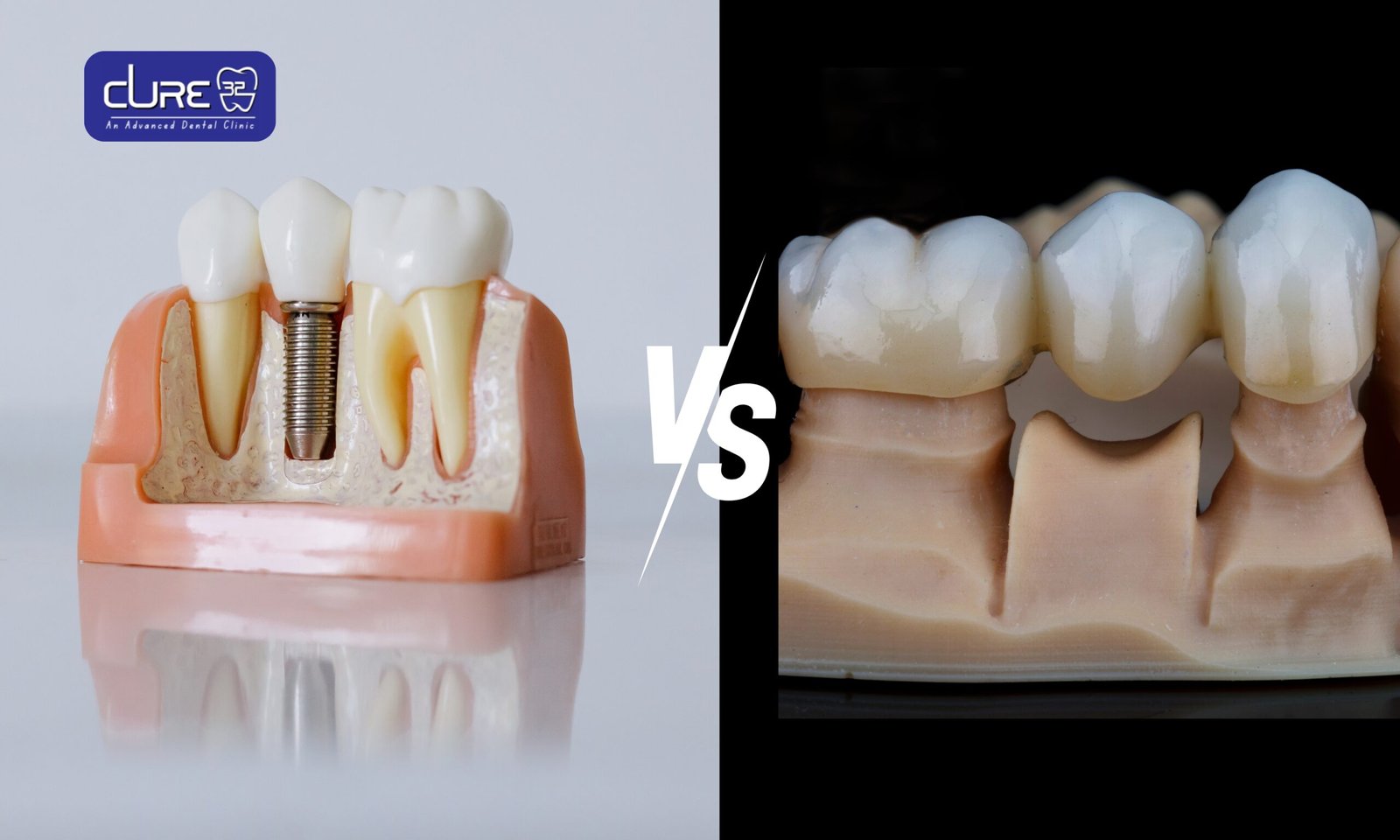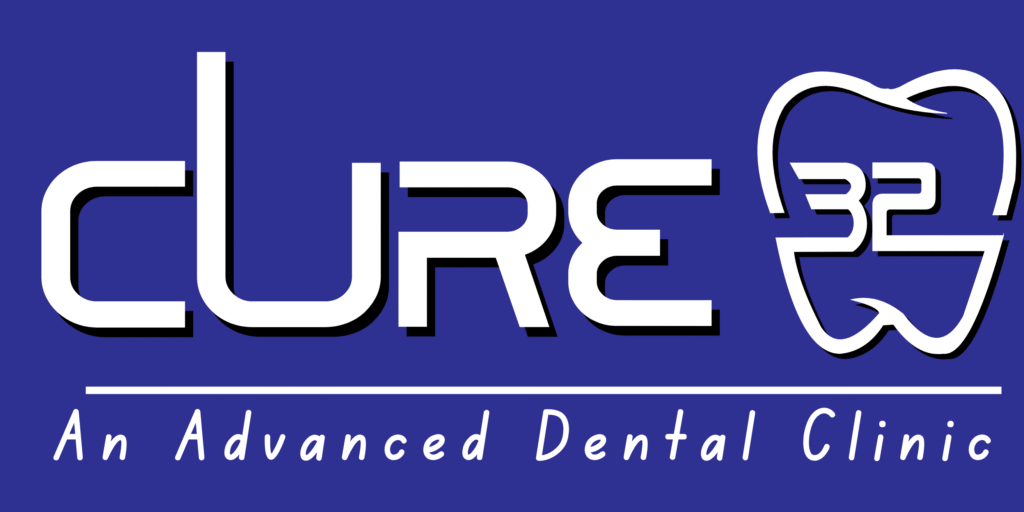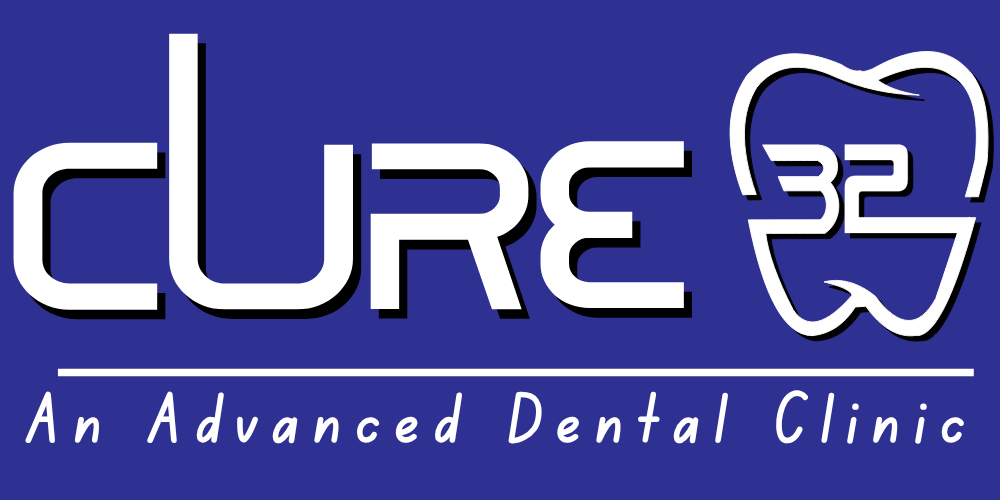Why Dental Implants Are Better Than Bridges?
Making the Right Choice for Your Smile
If you have a missing tooth, you might be wondering: Should I choose a dental implant or a dental bridge? This is a common question patients ask at Cure 32, an advanced dental clinic in Belur, Howrah. Choosing the best option can affect not only how your smile looks but also your comfort, chewing, speech, long-term oral health, and even your confidence.

What Are Dental Implants and Dental Bridges?
Dental Implants:
A dental implant is a small, strong titanium screw that is placed into your jawbone, acting as an artificial tooth root. On top of this, a dental crown (which looks like a natural tooth) is fixed. Implants can replace a single tooth, several teeth, or even all your teeth.
Dental Bridges:
A dental bridge “bridges” a gap left by a missing tooth. It uses crowns placed on the healthy teeth to either side (these teeth are called “abutments”) to support a false tooth in the middle. This means the dentist must prepare (trim) the teeth next to the empty space.
1. Dental Implants Look, Feel, and Function Like Natural Teeth
Implants closely mimic real teeth.
- The implant post fuses with your jawbone, giving a solid foundation for chewing, biting, or speaking.
- The visible part (crown) is designed to match the color and shape of your other teeth, making it almost impossible to tell apart from natural teeth.
- It feels natural in your mouth, so you can eat, speak, grin, and laugh with total confidence.
Bridges can look good, but aren’t the same.
- Bridges rest on the teeth next to the gap and do not fuse with the jawbone.
- You may notice a difference in how your teeth feel when biting, or food can get trapped under the false tooth.
2. Dental Implants Protect Healthy Teeth—No Cutting Needed
Dental Implants are independent.
- Implants are “stand-alone” solutions, so your dentist at Cure 32, Belur, does not need to file down healthy teeth next to the gap.
- All your healthy tooth structure is preserved and left untouched.
With Bridges, healthy teeth are cut.
- Getting a dental bridge requires the dentist to trim the healthy teeth on both sides of the gap.
- Once trimmed, these teeth might become more sensitive, weaker, and can develop cavities or other dental problems in the future.
3. Dental Implants Help Maintain and Protect Your Jawbone
Implants keep your bone healthy.
- When you lose a tooth, the underlying jawbone starts shrinking (“bone loss”) because there is no longer a tooth root to stimulate it.
- Dental implants act just like real roots, stimulating the bone and preventing further shrinkage.
- This keeps your jawbone strong and helps you maintain your natural face shape.
Bridges do not prevent bone loss.
- A dental bridge sits on the gums and the abutment teeth—it does not go into the bone.
- Without anything stimulating the bone where the tooth was lost, bone resorption (shrinking) continues, which can change your appearance over time and make future dental work harder.
4. Dental Implants Last Much Longer
Implants are a long-term investment.
- With proper care and regular check-ups at Cure 32 Dental Clinic, dental implants can last 20 years—or even a lifetime.
- Most dental bridges need to be replaced every 7–10 years on average.
Bridges may need frequent repair or replacement.
- Because bridges rely on the surrounding teeth, problems like decay or gum disease can mean the whole bridge needs to be replaced.
- The prepared teeth under a bridge may eventually become weak or damaged, increasing expenses over time.
5. Easy Maintenance and Hygiene with Implants
Implants are easy to clean.
- You can clean dental implants just like your natural teeth: brush, floss, and rinse as normal.
- No special cleaning tools are needed, and it’s easy to keep your mouth healthy.
Bridges can make cleaning difficult.
- Cleaning under the false tooth (“pontic”) of a bridge can be tricky. You may need special floss or brushes.
- If you don’t clean properly, bacteria can collect, leading to bad breath, gum infection, and decay of the supporting teeth.
6. Better Comfort, Chewing, and Speech with Implants
Eat all your favorite foods.
- Dental implants are anchored in your jaw, giving strong, stable bite power.
- You can eat apples, nuts, and even crunchy snacks without worries.
- Speech is natural and clear—no slipping or clicking.
Bridges may feel less secure.
- Bite forces are distributed to the supporting teeth rather than to the jawbone.
- Over time, the supporting teeth may weaken, affecting your chewing ability and sometimes your speech.
7. Implants Are the Top Choice for Single and Multiple Missing Teeth
One implant can replace one or more teeth.
- For several missing teeth in a row, you don’t need an implant for every gap—just a few can support a bridge of multiple teeth.
- Even if you’ve lost all teeth, “All-on-4” or “All-on-6” full-arch implants offer secure, permanent replacements.
Conventional bridges can only bridge small gaps.
- Multiple missing teeth in separate areas often mean more bridges, more tooth preparation, and more expense.
8. Cosmetic and Confidence Benefits
- Implants prevent the “sunken” look that can happen when bone is lost after extraction.
- They preserve your natural smile line and lip support.
- Patients at Cure 32 in Howrah often report increased self-esteem and willingness to smile after choosing implants!
9. Dental Implants May Be More Cost-Effective in the Long Run
While it’s true that dental implants often cost more up front, they usually last much longer, require fewer replacements, and prevent future dental problems.
Think about the hidden costs of bridges:
- Repeat replacements every few years
- Treatments for neighboring teeth that become decayed or damaged
- Possible bone grafts or dentures if bone loss becomes severe
A well-placed implant at Cure 32 Dental Clinic, Belur, can save you time, money, and hassle in the years to come.
10. Are Dental Implants Always the Best Choice?
In most cases, yes. But sometimes, a dental bridge—or another solution—may be recommended:
- When there isn’t enough healthy bone for implants (though bone grafting may be possible)
- In certain medical conditions (like uncontrolled diabetes)
- If a quick, non-surgical option is needed and the patient is not fit for a minor procedure
Your dentist at Cure 32, Belur, Howrah will always discuss all options with you, explaining the pros and cons based on your personal needs.
Common FAQs About Dental Implants vs Bridges
Q1: Are dental implants painful?
A: The procedure is done under local anesthesia, so you won’t feel pain during surgery. Mild discomfort after the procedure is normal but goes away quickly. Cure 32 offers advanced pain management techniques for your comfort.
Q2: How long does the implant process take?
A: Usually 3–6 months, including healing time for the bone to fuse with the implant. Some cases allow for faster solutions called “immediate implants.”
Q3: Can anyone get a dental implant?
A: Most adults are candidates, but it requires healthy gums and bone. Your specialist at Cure 32 will check suitability and suggest options if needed.
Q4: Do dental implants ever fail?
A: Implants have a success rate above 95% with good care. Smoking and poor oral hygiene can increase the risk of complications.
Q5: Are bridges cheaper than implants?
A: Bridges may cost less initially, but higher long-term maintenance and the risk to adjacent teeth often makes implants more cost-effective over the years.
Why Choose Cure 32 Dental Clinic for Dental Implants in Belur, Howrah?
Experienced implant specialists using advanced, pain-free technology
- Digital x-rays and 3D scanning for accurate planning and safe outcomes
- Transparent pricing, honest guidance, and flexible payment options
- Strict sterilization standards and a caring, welcoming team
Thousands of people in Belur and Howrah have chosen Cure 32 Dental Clinic to restore their confidence and oral health with implants. Our patient-focused approach and commitment to modern dentistry promise exceptional results from consultation to post-treatment care.

